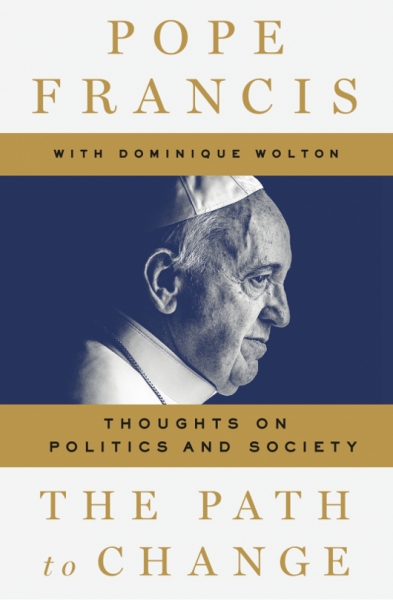The Path to Change
By Pope Francis and Dominique Wolton

Blurb
Pope Francis has re-engaged the Catholic Church with the modern world, by tackling difficult and urgent questions in order to illuminate the path to change.
French sociologist Dominique Wolton interviewed Pope Francis regularly over the course of a year, and the resulting dialogue builds a detailed picture of how Pope Francis became the most popular leader the Catholic Church has ever seen.
The Pope’s clarity, humility and humanity are evident in their dialogue. The Path to Change freely addresses the major issues of our time: peace and war, politics and religion, globalization and cultural diversity, fundamentalism and secularism, Europe and migrants, ecology, family, time, trust and joy.
Our Review
When I saw The Path to Change advertised I was intrigued despite being an atheist, after all its not very often you get to read a book written by a pope. The Path to Change features a series of interviews conducted by Dominique Wolton in which Pope Francis discusses his views on social and political issues.
The Path to Change begins with a very powerful speech from Pope Francis on what he considers to be the most pressing issue of our time.
“Recently I said and now I repeat, we are going through World War Three but in instalments. There are economic systems that must make war in order to survive. Accordingly, are manufactured and sold and, with that, the balance sheet of economics that sacrifice man at the feet of the idol of money are clearly rendered healthy. And no thought is given to hungry children in refugee camps; no thought is given to the forcibly displaced; no thought is given to destroyed homes; no thought is given, finally, to so many destroyed lives.”
High on the Pope’s agenda is a sense of social responsibility for everyone not just the religious.
“I dream of a Europe that promotes and protects the rights of everyone, without neglecting it’s duties towards all. I dream of a Europe of which it will not be said that its commitment to human rights was its last utopia.”
It is clear from the interviews that the Pope is a very personable man and certainly not a stuffy, empty figurehead.
Dominque Wolton performed very well in the role of interviewer asking some insightful questions and making some valid observations. For example:
“Sometimes I get dizzy when I think of the crushing responsibilities that weigh on his shoulders. How can he choose, think, amid so many obligations, and requests? How can he listen and act, not only on behalf of the Church, but also many global affairs? How does he do it?”
Once again, I must reiterate the depths of his concern about immigration.
“The problem begins in the countries that the refugees come from. Why do they leave their home? Because of a lack of work or because of a war. Those are the two main reasons. Lack of work, because they have been exploited – I’m thinking of the Africans. Europe has exploited Africa…The other reasons for migration is war. If you invest, people will find jobs and won’t need to leave, but if there is war, they will have to flee anyway. And who’s making war? Who’s giving them weapons? We are.”
Pope Francis is particularly outspoken about the evils of the arms trade, and again his opinions are very close to my own.
“We supply them with the weapons so they destroy themselves. People complain that migrants are coming to destroy us. But we’re the ones who are sending them the weapons."
During the interviews Pope Francis repeatedly stresses the important of communication and building bridges and the dangers of globalisation.
I found this book fascinating and was pleasantly surprised by how much I enjoyed reading it.
I was hesitant to request this book because I am not religious, but I am really pleased I did because a lot of the views expressed by Pope Francis, particularly on immigration, are views I share. It was a thoroughly absorbing read and despite being evasive on some topics he was generally honest and open.
Our Final Rating...
Read & Shared 84 Times.



Get In Touch
Please feel free to leave a comment to this book review below. Or even leave your own review if you like.
If you run a blog and/or have posted a review to this book, a Q & A or general author interview online you can always add a trackback to it here and following moderation we'll add a link to it below.